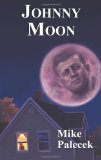Some historical events take on such significance they become ingrained in a nation’s culture. The assassination of President John F. Kennedy is one such event. In part because of the conspiracy theories that have grown up around it, nearly 50 years later we still see a variety of books, both novels and nonfiction, published about it. The assassination and the questions of conspiracy that arose almost immediately are the building blocks for Mike Palecek’s latest novel, Johnny Moon. And while the conspiracy theories are a driving force, certain readers will see an ability to evince the times as the novel’s real strength.
 The title character is a third grader in a Catholic school when Kennedy is killed. Johnny is flush with not only the hopes and dreams of a third grader — becoming physically fit in response to Kennedy’s promotion of fitness — but the hopes and dreams that reflect the Kennedy Administration more broadly — going to the Moon and fighting Communism. In fact, Johnny is fond of quoting the phrase from Kennedy’s speech announcing the lunar program, that Americans pursue such goals “not because they are easy, but because they are hard.” This is a unique time in American history, post-50s but before the tumult and disarray of the late 1960s. It is a time that seemed so much simpler and clear.
The title character is a third grader in a Catholic school when Kennedy is killed. Johnny is flush with not only the hopes and dreams of a third grader — becoming physically fit in response to Kennedy’s promotion of fitness — but the hopes and dreams that reflect the Kennedy Administration more broadly — going to the Moon and fighting Communism. In fact, Johnny is fond of quoting the phrase from Kennedy’s speech announcing the lunar program, that Americans pursue such goals “not because they are easy, but because they are hard.” This is a unique time in American history, post-50s but before the tumult and disarray of the late 1960s. It is a time that seemed so much simpler and clear.
Johnny’s story reflects the disruption of the times. The sister of a nun at his school witnesses the assassination. Glimpses of her story reveal various facts with which anyone who has read about the conspiracy theories is familiar. Johnny, occasionally picked on for his seemingly odd ways, becomes the leader of an odd assortment of people who come to believes the school boiler possesses special powers, powers that among other things may reveal what really happened in Dallas. Johnny leads classmates, nuns and a couple maintenance workers on a type of vision quest to assuage the rupture in their previously ordered world and the suggestion that the assassination may not be as it seems.
At times, this search may strike readers as a tad confusing. Moreover, it doesn’t quite ring true the Catholic school environment in which it occurs. This is surprising because perhaps the strongest part of the book is Palecek’s ability to capture the culture and and atmosphere of Catholic schools at the time. As he notes in a prologue, in the 1960s “every berg, town and ville in the Midwest boasted a Catholic block of school, rectory and convent.” That was certainly the case in my hometown, where I was a second grader in a Catholic school at the time of the Kennedy assassination. The school took up half block. The rectory and sat on a quarter of a block across the street. And even though my hometown had a population of less than 15,000 at the time, it had two Catholic schools.
There is no doubt the Catholics took pride in JFK being the first Catholic president. That pride bolstered the sense of exhilaration many others in the country felt. But it also bolstered the Catholic education system being one in which patriotism and religion went hand-in-hand, particularly when it came to “the Red Menace.” It was virtually doctrine among students in Catholic schools that unless the government continued to battle Communism, the Catholic Church would be a primary target when the Russians invaded. Regardless of the size of the town, children in Catholic schools “realized they would be soon rounded up by Russian soldiers and made to line up in the playground and say there is no God.”
Thus, although Johnny Moon‘s main theme purports to be the Kennedy assassination, those of a certain era, particularly those who attended a Catholic elementary schools, will see it differently. To us, Johnny’s life and beliefs are a surprisingly insightful and accurate commentary on an aspect of life never forgotten but rarely finding its way into print.
They looked at JFK on TV, smart, handsome, smiling, funny, and just knew they were in the best place and time there had ever been…
Mike Palecek, Johnny Moon







